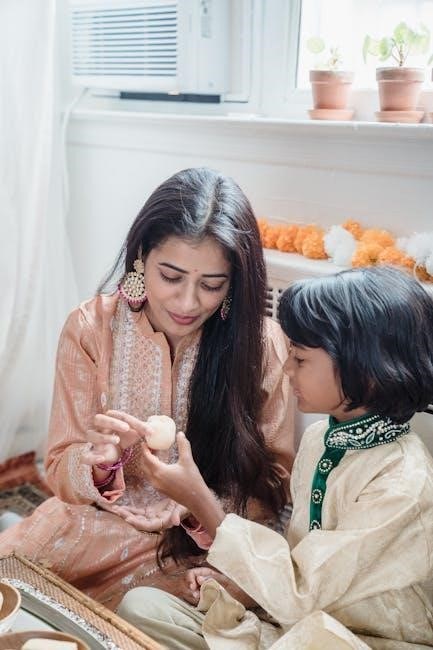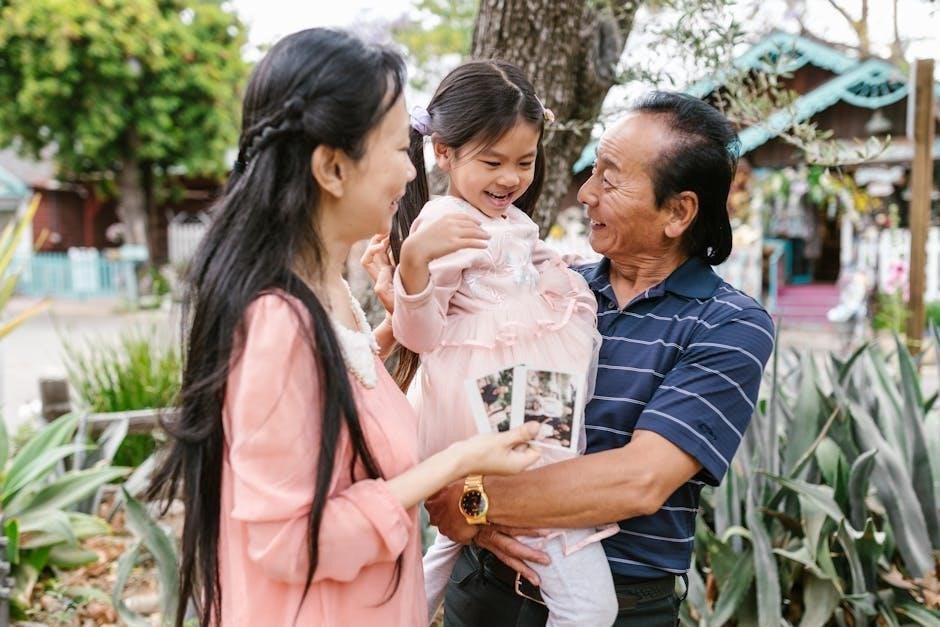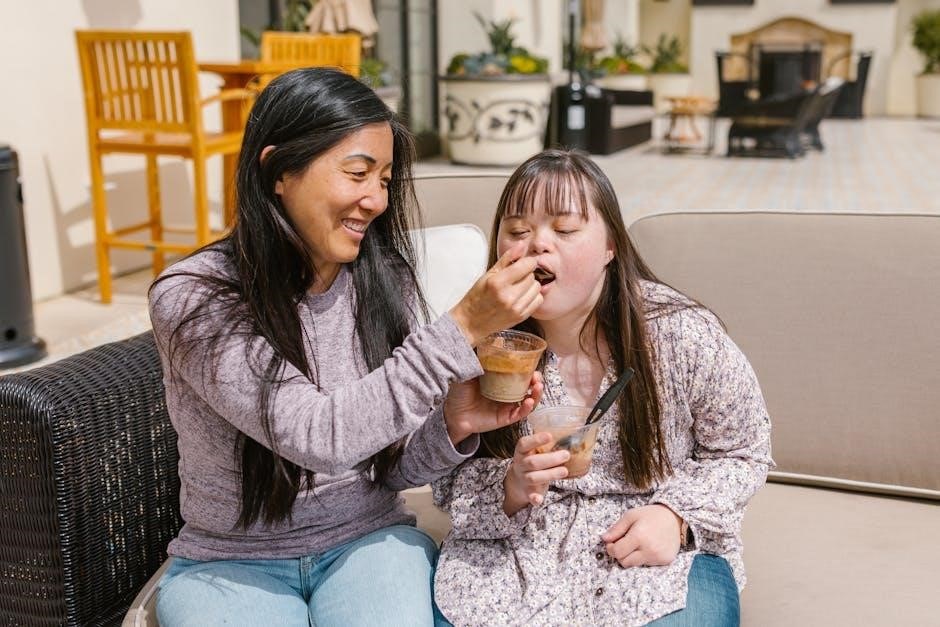Relationship values are core principles guiding interactions, fostering harmony, trust, and mutual respect. They form the foundation for lasting connections and personal growth in relationships.
1.1 Definition and Importance of Relationship Values
Relationship values are the core principles that guide interactions, fostering trust, respect, and emotional connection. They define what matters most in a partnership, such as honesty, communication, and empathy. These values are essential because they create a foundation for understanding and harmony, enabling individuals to navigate conflicts and support each other’s growth. Shared values align expectations, ensuring both partners work toward common goals. Strong relationship values promote stability, intimacy, and mutual satisfaction, making them the cornerstone of lasting and fulfilling connections.
1.2 Why Values Matter in Building Strong Relationships
Values are the bedrock of strong relationships, shaping how individuals interact and relate to one another. They guide behavior, decision-making, and conflict resolution, ensuring alignment in expectations and goals. Shared values foster trust, respect, and emotional connection, creating a harmonious environment for growth. By understanding and respecting each other’s values, partners can navigate challenges effectively and build intimacy. When values align, relationships become more resilient, fostering mutual satisfaction and a deeper sense of connection. Ultimately, values are the glue that holds relationships together, ensuring they remain meaningful and fulfilling over time.

Core Relationship Values
Core relationship values include honesty, communication, mutual respect, trust, and accountability. These principles foster emotional connection, understanding, and reliability, forming the essence of meaningful relationships.
2.1 Honesty and Transparency
Honesty and transparency are foundational to healthy relationships, fostering trust and openness. Being truthful about thoughts, feelings, and actions creates a secure environment for both partners. Transparency ensures that intentions and behaviors align, reducing misunderstandings and fostering mutual respect. Without honesty, relationships can suffer from mistrust and resentment. Practicing honesty involves vulnerability, which strengthens emotional bonds. Transparency also promotes accountability, encouraging partners to take responsibility for their actions. Together, these values build a reliable and enduring connection, essential for navigating life’s challenges together and maintaining a lasting, respectful relationship.
2.2 Communication and Active Listening
Effective communication and active listening are vital for fostering understanding and connection in relationships. Open dialogue ensures that thoughts and feelings are expressed clearly, while active listening involves fully engaging with the speaker. This mutual exchange builds trust and strengthens emotional bonds. Active listening requires empathy, focus, and patience, allowing partners to feel heard and validated. Regular, meaningful communication helps resolve conflicts and prevents misunderstandings. By prioritizing these values, relationships become more resilient and fulfilling, creating a foundation of mutual respect and deeper connection.
2.3 Mutual Respect and Empathy
Mutual respect and empathy are cornerstone values in any thriving relationship. Respect ensures both partners value each other’s opinions, feelings, and boundaries, fostering equality and dignity. Empathy allows individuals to understand and share each other’s emotions, creating a supportive and compassionate environment. These values help navigate differences and conflicts, promoting understanding and harmony. By prioritizing respect and empathy, relationships become more secure and fulfilling, as each person feels validated and appreciated. These qualities are essential for building trust, resolving disagreements, and maintaining a balanced, loving connection over time.
2.4 Trust and Reliability
Trust and reliability are foundational pillars of healthy relationships, ensuring both partners feel secure and supported. Trust builds confidence in your partner’s actions and decisions, fostering loyalty and dependability. Reliability reinforces this by demonstrating consistency and follow-through on commitments. Together, these values create a stable environment where both individuals can rely on each other during challenging times. Trust and reliability not only strengthen emotional bonds but also promote resilience, enabling the relationship to withstand life’s uncertainties. They are essential for long-term satisfaction and mutual confidence in the partnership’s future.
2.5 Accountability and Responsibility

Accountability and responsibility are vital in fostering a healthy and balanced relationship. Being accountable means owning your actions and their impact on your partner, while responsibility involves taking initiative in your commitments. These values promote mutual respect, trust, and fairness, ensuring both partners feel secure and valued. By embracing accountability, individuals demonstrate maturity and a willingness to grow together. Responsibility strengthens the bond, showing dedication to shared goals and individual well-being. Together, these values create a foundation of reliability and integrity, essential for navigating life’s challenges as a team.

Emotional Connection and Intimacy
Emotional connection and intimacy are essential for deep, meaningful relationships. They foster trust, vulnerability, and understanding, creating a safe space for partners to share and connect deeply.

3.1 Vulnerability in Relationships
Vulnerability is a cornerstone of emotional connection, allowing individuals to openly share their true selves, fears, and desires. It fosters trust and intimacy, creating a safe space for mutual understanding. By embracing vulnerability, partners build a foundation of authenticity, which strengthens their bond and deepens emotional closeness. Vulnerability also encourages empathy and support, helping both individuals feel valued and secure. However, it requires courage and a willingness to be open, which can be challenging but ultimately rewarding for relationship growth and harmony.
3.2 Building and Maintaining Intimacy

Intimacy is crucial for emotional and physical closeness in relationships. It involves creating a safe space for vulnerability and trust, allowing partners to connect deeply. Maintaining intimacy requires consistent effort, such as regular communication, shared activities, and emotional support. As relationships grow, intimacy may evolve, but the foundation of trust and openness remains vital. By prioritizing intimacy, couples can foster a more fulfilling and connected relationship, enhancing overall satisfaction and bond strength. This mutual connection is essential for long-term relationship health and mutual respect.
3.3 Emotional Support and Validation

Emotional support and validation are vital for fostering a nurturing relationship. They involve actively listening to your partner, acknowledging their feelings, and offering empathy. Validation helps your partner feel understood and valued, strengthening trust and intimacy. Consistent emotional support provides a sense of security, enabling both individuals to navigate life’s challenges together. By prioritizing emotional well-being, relationships become more resilient and fulfilling. Regular expressions of care and understanding are essential for maintaining harmony and mutual respect, ensuring both partners feel supported in their personal and shared journeys.

Independence and Interdependence
Independence and interdependence balance personal growth with shared goals, fostering healthy relationships. Respecting individuality while nurturing teamwork ensures mutual support and harmony, enriching both partners’ lives.
4.1 Importance of Personal Space
Personal space is essential for emotional well-being and maintaining individuality in relationships. It allows time for reflection, hobbies, and independence, fostering a healthier, more balanced partnership. Respecting boundaries prevents feelings of suffocation or resentment, ensuring each person can recharge and grow separately. This space strengthens trust and mutual respect, as it acknowledges the need for alone time without jeopardizing the connection. Healthy relationships thrive when both partners understand and honor the importance of personal space, creating a harmonious blend of togetherness and independence.
4.2 Balancing Individual and Shared Goals
Balancing individual and shared goals is crucial for a fulfilling relationship. While personal aspirations are vital for growth, shared goals strengthen the bond and create a sense of unity. Aligning expectations ensures both partners feel supported and valued. Open communication helps navigate differences, fostering compromise and mutual understanding. This balance prevents resentment and promotes a sense of teamwork, allowing the relationship to thrive. By respecting individual goals and working together on shared ones, couples build a foundation of trust, commitment, and shared purpose. This harmony enriches the relationship and ensures long-term satisfaction for both partners.
4.3 Healthy Dependence in Relationships
Healthy dependence in relationships fosters trust and security, allowing partners to rely on each other emotionally and practically. It promotes mutual support and collaboration, enhancing the bond without compromising individual autonomy. Unlike unhealthy dependence, which can lead to loss of identity, healthy dependence encourages interdependence, where both partners maintain their independence while leaning on each other for strength. This balance ensures that neither partner feels overwhelmed or neglected, creating a stable and nurturing environment for growth and shared experiences. Healthy dependence cultivates resilience and teamwork, benefiting both individuals and the relationship as a whole.
Conflict Resolution and Forgiveness
Conflict resolution and forgiveness are vital for nurturing trust and understanding. Addressing disagreements constructively strengthens bonds and fosters emotional healing, ensuring relationships grow resiliently over time.
5.1 Constructive Arguments and Problem-Solving
Constructive arguments focus on respectful communication, fostering understanding rather than blame. Active listening and empathy are key, ensuring both partners feel heard. By addressing issues collaboratively, conflicts become opportunities for growth. Tools like Fair Play help redistribute responsibilities, promoting fairness and reducing tension. Problem-solving in relationships thrives when both partners prioritize solutions over winning arguments. This approach strengthens trust and deepens emotional bonds, allowing relationships to evolve resiliently. Effective conflict resolution requires patience, openness, and a shared commitment to mutual satisfaction, ensuring challenges are met as a team.
5.2 The Role of Forgiveness in Relationships
Forgiveness in relationships is essential for healing and moving forward after conflicts. It involves letting go of negative emotions tied to past hurts, fostering an environment of trust and understanding. Forgiveness doesn’t erase the past but allows partners to release resentment and work towards rebuilding their connection. This process requires empathy and commitment, ensuring both individuals feel valued and heard. By embracing forgiveness, relationships can overcome adversity, leading to personal growth and a stronger bond. Forgiveness is a cornerstone of resilient relationships, enabling couples to navigate challenges with grace and mutual respect.

5.3 Moving Forward After Conflicts
Moving forward after conflicts involves both partners committing to growth and understanding. It requires acknowledging mistakes, learning from the experience, and implementing changes to prevent similar issues. Effective communication and active listening are crucial to rebuild trust and strengthen the bond. By focusing on solutions rather than blame, couples can create a healthier dynamic and deepen their emotional connection. This process fosters resilience, allowing relationships to emerge stronger and more aligned with shared values. Moving forward is not forgetting but growing together, ensuring conflicts become opportunities for mutual understanding and improvement.
Shared Goals and Values Alignment
Shared goals and values alignment strengthen relationships by fostering commitment and collaboration. When both partners prioritize common objectives, it creates a unified direction, deepening trust and mutual respect.
6.1 Identifying Common Values and Goals
Identifying common values and goals is essential for building a strong, aligned relationship. Start by openly discussing each other’s priorities, beliefs, and aspirations. Reflect on what matters most to both partners, such as honesty, respect, or career ambitions. Comparing individual value lists can reveal overlaps and areas for compromise. Shared goals, like saving for a home or starting a family, create a sense of unity and purpose. Regularly revisiting these values ensures alignment as circumstances evolve, fostering a deeper connection and mutual understanding.
6.2 Aligning Expectations in Relationships
Aligning expectations in relationships involves open communication and mutual understanding of each partner’s needs, desires, and boundaries. Regularly discussing expectations ensures both individuals are on the same page, reducing misunderstandings. Accountability and commitment to shared goals strengthen the bond, while flexibility allows for growth and change. Navigating differences respectfully and seeking compromises fosters harmony. By clarifying expectations early and revisiting them as circumstances evolve, couples can build trust and create a balanced, fulfilling partnership rooted in mutual respect and understanding; This alignment is key to sustaining a healthy, evolving relationship.
6.3 Navigating Differences in Values
Navigating differences in values requires open communication and a willingness to understand each other’s perspectives. When core values clash, it’s essential to identify common ground and find compromises. Respect for differing beliefs fosters mutual understanding and strengthens the relationship. By acknowledging and valuing diversity in perspectives, couples can build a foundation of empathy and tolerance. This process involves active listening, empathy, and a commitment to growth, ensuring that differences enrich rather than divide the relationship. Aligning on shared goals while respecting individual values promotes harmony and long-term connection.



About the author